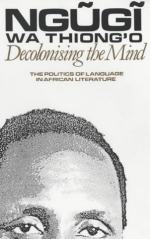|
This section contains 1,080 words (approx. 3 pages at 400 words per page) |

|
Summary
In Part VI, Ngũgĩ outlines the different segments of the bourgeoisie, a class that was beginning to assume leadership of the countries that had recently been decolonized. This class used literature to show the world that “Africa had a past and a culture of dignity and human complexity” (20). As Ngũgĩ tells it, this literature was initially part of a “general political awakening” (21) across Asia, Africa, and Latin America. However, when the bourgeoisie came into political power and strengthened ties with imperialism, this literature became “critical, cynical, disillusioned, bitter, and denunciatory in tone” (21). It sought a new peasant audience, attempted class analysis, and critiqued neocolonialism—but, as Ngũgĩ points out, from within European languages. The choice of language reflected the vacillating, indeterminate position of the petty-bourgeoisie in African countries, and created the false, absurd image...
(read more from the Chapter 1 (Parts VI-IX): The Language of African Literature Summary)
|
This section contains 1,080 words (approx. 3 pages at 400 words per page) |

|




